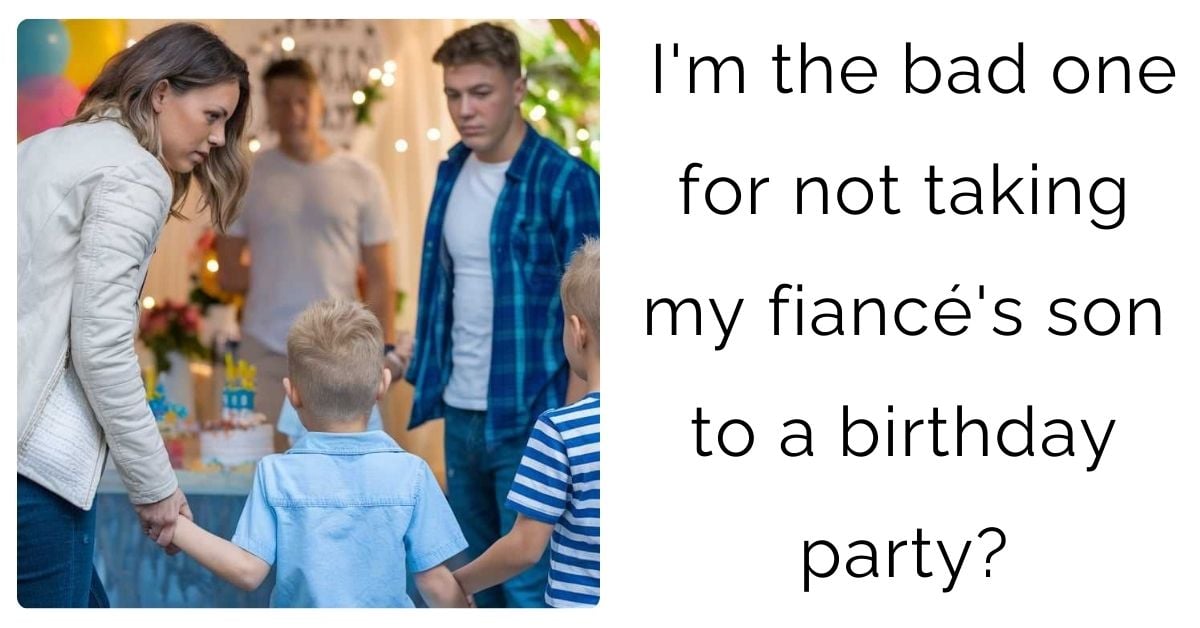Am I the Villain for Not Taking My Fiancé’s Teen to a Kid’s Birthday Party?

A mom was invited to take her two young sons to a birthday party and was told they were the only ones invited. However, her fiancé insisted that she also take his 15-year-old son, even though he wasn’t included in the invitation.
She refused, explaining that it wasn’t her party to extend an invitation. This sparked a disagreement, with her fiancé accusing her of excluding his son and being unfair. Read the full story below.

‘ Am I the Villain for Not Taking My Fiancé’s Teen to a Kid’s Birthday Party?’
Last weekend, my 5-year-old son was invited to a birthday party. The mom who organized it was kind enough to tell me I could bring my 7-year-old son along too since he’s in the same age range. It felt like it would be a fun day for both of them.
But then, my fiancé asked me to take his 15-year-old son with us. He said it was his weekend to have him, and he didn’t want his son feeling left out. I hesitated and told him I couldn’t do that. It wasn’t my party, and only my kids were invited. Bringing a teenager to a party meant for little kids felt out of place to me.
My fiancé wasn’t happy. He said I was being unfair and excluding his son. I suggested that he spend some quality time with his son instead while I took my boys to the party. But that didn’t sit well with him either. He insisted that wouldn’t make up for the situation and even asked me to reach out to the host to see if it would be okay to bring his son along. I refused.
Now, he’s upset with me, and I’m left wondering—did I handle this the wrong way? Was I being unreasonable, or was he asking too much?
Let’s dive into the reactions from Reddit:
untimelyblacksmith − What 15 year old wants to go to a 5 year old’s birthday party?
CptKUSSCryAllTheTime − Your “husband” wants you to take a 15yr old to a 5yr old’s birthday party bc he would feel left out? Unless you are leaving out a mental disability in your stepson where he operates more on the younger age range then NTA. I’m finding it hard to believe that he would want that.
AnonThrowAway072023 − What a s**tty dad he is. It’s his weekend visitation with his 15 yo and wants to send him off to a strangers 5 yo baby birthday party. Pls, let this dumb b**tard read this post later and the reactions
beek_r − NTA! What 15 year old would want to attend a birthday party for five year olds? And the mother of the birthday child certainly isn’t going to want some strange almost adult hanging out at the birthday party. Your fiance is being a crappy parent.
Fleetdancer − So did you know he was a s**tty father when you got engaged to him? Is he the father of your children?
BlueGreen_1956 − NTA. Your fiancé can take his 15-year-old son to Hooters for lunch. He will enjoy that much more. Trust me.
AlleyOKK93 − He just wants to push off being a parent onto you.
JTBlakeinNYC − NTA. A 15 year old does not belong at a 5 year old’s birthday party.
WonderfulVillage6546 − Do you really want to marry a dude who won’t take care of or spend time with his own 15yo son once a fortnight? Who would rather palm the lad off on you and thinks he’ll feel left out if he doesn’t go to a 5 year old’s birthday party?
brittdre16 − This would be very different if his son was 5-8. What 15 year old would even have fun at that party!

